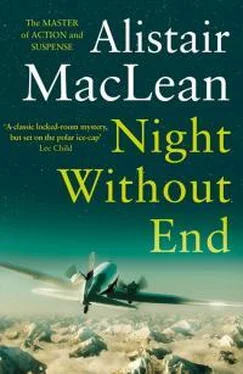Алистер Маклин - Night Without End
Здесь есть возможность читать онлайн «Алистер Маклин - Night Without End» — ознакомительный отрывок электронной книги совершенно бесплатно, а после прочтения отрывка купить полную версию. В некоторых случаях можно слушать аудио, скачать через торрент в формате fb2 и присутствует краткое содержание. Год выпуска: 101, Жанр: Боевик, Триллер, на английском языке. Описание произведения, (предисловие) а так же отзывы посетителей доступны на портале библиотеки ЛибКат.
- Название:Night Without End
- Автор:
- Жанр:
- Год:101
- ISBN:нет данных
- Рейтинг книги:4 / 5. Голосов: 1
-
Избранное:Добавить в избранное
- Отзывы:
-
Ваша оценка:
- 80
- 1
- 2
- 3
- 4
- 5
Night Without End: краткое содержание, описание и аннотация
Предлагаем к чтению аннотацию, описание, краткое содержание или предисловие (зависит от того, что написал сам автор книги «Night Without End»). Если вы не нашли необходимую информацию о книге — напишите в комментариях, мы постараемся отыскать её.
An airliner crashes in the polar ice-cap. In temperatures 40 degrees below zero, six men and four women survive. But for the members of a remote scientific research station who rescue them, there are some sinister questions to answer – the first one being, who shot the pilot before the crash?
Night Without End — читать онлайн ознакомительный отрывок
Ниже представлен текст книги, разбитый по страницам. Система сохранения места последней прочитанной страницы, позволяет с удобством читать онлайн бесплатно книгу «Night Without End», без необходимости каждый раз заново искать на чём Вы остановились. Поставьте закладку, и сможете в любой момент перейти на страницу, на которой закончили чтение.
Интервал:
Закладка:
I pulled the torch out from my parka, located the oil-lamp and lit it. The light was dim, scarcely reaching the far corners of the cabin, but sufficient to show the mummy-like figures lying huddled on the bunks and sprawled grotesquely across the floor, their frozen breath clouding before their faces and above their heads, then condensing on the cabin walls. The walls themselves were sheeted with ice which had extended far out across the roof, in places reaching the skylights, a condition largely brought about by the cold heavy air that had flooded down the opened hatchway during the night: the outside temperature registered on the drum at 54° below zero.
Not everyone was asleep: most of them, I suspected, had slept but little, the numbing cold had seen to that: but they were as warm in their bunks as they would be anywhere else and nobody showed any inclination to move. Things would be better when the cabin heated up a little.
I had trouble starting the stove – even though it was gravity fed from a tank above and to one side of it, the fuel oil had thickened up in the cold – but when it did catch it went with a roar. I turned both burners up to maximum, put on the water bucket that had lain on the floor all night and was now nearly a solid mass of ice, pulled on snow-mask and goggles and clambered up the hatchway to have a look at the weather.
The wind had died away almost completely – I’d known that from the slow and dispirited clacking of the anemometer cups – and the ice-drift, which at times could reach up several hundred feet into the sky, was no more than gentle puffs of dust stirring lazily and spectrally, through the feeble beam of my torch, across the glittering surface of the ice-cap. The wind, such as it was, still held out to the east. The cold, too, was still intense, but more bearable than it had been on the previous night. In terms of the effect of cold on human beings in the Arctic, absolute temperature is far from being the deciding factor: wind is just as important – every extra mile per hour is equivalent to a one degree drop in temperature – and humidity far more so. Where the relative humidity is high, even a few degrees below zero can become intolerable. But today the wind was light and the air dry. Perhaps it was a good omen … After that morning, I never believed in omens again.
When I got below, Jackstraw was on his feet, presiding over the coffee-pot. He smiled at me, and his face was as fresh and rested as if he’d had nine hours on a feather bed behind him. But then Jackstraw never showed fatigue or distress under any circumstances: his tolerance to sleeplessness and the most exhausting toil was phenomenal.
He was the only one on his feet, but far from the only one awake: of those in the bunks, only Senator Brewster was still asleep. The others were facing into the centre of the room, a few propped up on their elbows: all of them were shivering, and shivering violently, their faces blue and white and pinched with the cold. Some were looking at Jackstraw, wrinkling their noses in anticipation of the coffee, the pungent smell of which already filled the cabin; others were staring in fascination at the sight of the ice on the roof melting as the temperature rose, melting, dripping down to the floor in a dozen different places and there beginning to form tiny stalagmites of ice, building up perceptibly before their eyes: the temperature on the cabin floor must have been almost forty degrees lower than that at the roof.
‘Good morning, Dr Mason.’ Marie LeGarde tried to smile at me, but it was a pathetic effort, and she looked ten years older than she had on the previous night: she was one of the few with a sleeping-bag, but even so she must have passed a miserable six hours, and there is nothing so exhausting to the human body as uncontrollable night-long shivering, a vicious circle in which the more one shivers the more tired one becomes, and the more tired the less resistance to cold and hence the more shivering. For the first time, I knew that Marie LeGarde was an old woman.
‘Good morning,’ I smiled. ‘How did you enjoy your first night in your new home?’
‘First night!’ Even in the sleeping-bag her movements of clasping her arms together and huddling her head down between her shoulders were unmistakable. ‘I hope to heaven that it’s the last night. You run a very chilly establishment here, Dr Mason.’
‘I’m sorry. Next time we’ll keep watches and have the stove on all night.’ I pointed to the water splashing down to the floor. ‘The place is heating up already. You’ll feel better when you have some hot coffee inside you.’
‘I’ll never feel better again,’ she declared vigorously, but the twinkle was back in her eye. She turned to the young German girl in the next bunk. ‘And how do you feel this morning, my dear?’
‘Better, thank you, Miss LeGarde.’ She seemed absurdly grateful that anyone should even bother to ask. ‘I don’t feel a thing now.’
‘Means nothing,’ Miss LeGarde assured her cheerfully. ‘Neither do I. It’s just that we’re both frozen stiff … And how did you survive the night, Mrs Dansby-Gregg?’
‘As you say, I survived.’ Mrs Dansby-Gregg smiled thinly. ‘As Dr Mason observed last night, this is not the Ritz … That coffee smells delicious. Bring me a cup over, Fleming, will you?’
I picked up one of the cups Jackstraw had poured out and took it across to the young German girl who was struggling to unzip her sleeping-bag with her one good arm. Her embarrassment and discomfort were obvious, but I knew I’d no option, the time to stop this nonsense was before ever it had a chance to start.
‘You stay where you are, young lady, and drink this.’ She took the cup reluctantly, and I turned away. ‘You’ve surely forgotten, Mrs Dansby-Gregg, that Helene has a broken collar-bone?’
The expression on her face made it quite obvious that she hadn’t forgotten, but she was no fool. The gossip columnists would murder her for this, if they got hold of it. In her circle, an outward if meaningless conformity to the accepted mores and virtues of the day was a sine qua non: the knife between the ribs was permitted, but only to the accompaniment of the well-bred smile.
‘I’m so sorry,’ she said sweetly. ‘I’d quite forgotten, of course.’ Her eyes were cold and hard, and I knew I had an enemy. That didn’t worry me, but I found the very triviality of the whole thing irritating beyond measure when there were so many other and vastly more important things to talk about. But less than thirty seconds later we had forgotten all about it, even, I am sure, Mrs Dansby-Gregg herself.
I was just handing Marie LeGarde a cup when someone screamed. It wasn’t really loud, I suppose, but in that confined space it had a peculiarly piercing and startling quality. Marie LeGarde’s arm jerked violently and the scalding contents of the coffee-cup were emptied over my bare hand.
I hardly noticed the pain. It was Margaret Ross, the young stewardess, who had screamed, and she was now kneeling, half in and half out of her sleeping-bag, one rigidly spread-fingered hand stretched out at arm’s length before her, the other clasped over her mouth as she stared down at the figure lying near her on the floor. I pushed her to one side and sank on to my own knees.
In that bitter cold it was impossible to be any way sure, but I felt reasonably certain that the young pilot had been dead for several hours. I knelt there for a long time, just looking down at him, and when I finally rose to my feet I did so like an old man, a defeated old man, and I felt as cold, almost, as the dead man lying there. Everyone was wide awake now, everyone staring at me, the eyes of nearly all of them reflecting the superstitious horror which the presence of sudden and unexpected death brings to those who are unaccustomed to it. It was Johnny Zagero who broke the silence.
Читать дальшеИнтервал:
Закладка:
Похожие книги на «Night Without End»
Представляем Вашему вниманию похожие книги на «Night Without End» списком для выбора. Мы отобрали схожую по названию и смыслу литературу в надежде предоставить читателям больше вариантов отыскать новые, интересные, ещё непрочитанные произведения.
Обсуждение, отзывы о книге «Night Without End» и просто собственные мнения читателей. Оставьте ваши комментарии, напишите, что Вы думаете о произведении, его смысле или главных героях. Укажите что конкретно понравилось, а что нет, и почему Вы так считаете.










